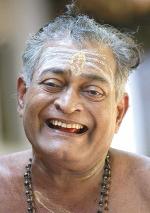Unconventional on Stage, Archetypal at Home
In his prime during the 1970s, Kottakkal Sivaraman used to take his little children to the Kathakali shows he would perform far and near their home. That was not exactly to instill in the two daughters interest about the dance-drama which lent him fame, but to dilute an away-from-family feel at venues where nights were long and tough.
“He would take me and my elder sister to the greenroom. Soon, we’ll all have supper together,” recalls Kalamandalam Ambili, the second daughter of Sivaraman. “But once he sits for the make-up, father would avoid interacting with us till the end of his act on the stage.”
His prowess in essaying female characters in a hitherto-untried manner is something that has given Sivaraman a cult status in the history of the four-century-old ballet. As his third death anniversary falls this month, the art circuit is organising a remembrance programme on July 19 and 20 at the master’s native village of Karalmanna in Palakkad district.
Karalmanna — green, rugged and close to Cherplassery — is where Ambili, a Mohiniyattam danseuse who now teaches the art in her alma mater, spent her formative years.
“I’ve heard my father later say that I was only three-and-a-half years old when he first took me for Kathakali. That was at Guruvayur in 1976,” she says.
The toddler got irked as she saw her father dance as a woman, and began crying. “He ignored the distraction. Patience!” exclaims Ambili.
Back home that morning, Sivaraman’s wife laughed hearing the story. “I told him,” recounts Madhavathodi Bhavani, “Didn’t I caution you not to take the child out?” Sivaraman anyway knew the risk: such small pleasures brought in their share of pain as well. “Only months later, something funnier happened when father took us both kids to another Kathakali venue. At Karikkad, near Manjeri,” says V.P. Sujatha, Sivaraman’s elder daughter.
There, as Damayanti, abandoned by her husband Nala in the woods, was seen straining to walk with a python by her foot, she began screaming aloud: “A snake has bitten my father!”
Kalamandalam Ramankutty Nair, who acted that night as the hunter who rescues Damayanti, later showed the girls at the greenroom that the reptile was just an effigy. “He even took some cotton out of it.”
Sivaraman’s only son Gireesh Appu, who is eight years younger to Sujatha, treasures memories about the master’s post-performance arrivals at home. “Whatever time of day or night he walked down to the veranda of our house, father’s shoulder bag would have something he had bought for us children… Toffees, biscuits, snacks, small toys,” says the 35-year-old, working in Kochi.
Sujatha, now settled in Mumbai, says how her father met her desire to appear on the Kathakali stage, by facilitating her do an inconsequential role. “It must be in the mid-1980s. At the Cherplassery temple festival, I did Sandhyavali in Rugmangada Charitam,” she chuckles. “Gopimama (Kalamandalam Gopi), who was acting as the hero opposite my father, was already tipped not to ask (in mudra format) me any extra question.”
Contrastingly, Ambili was made to receive proper training in Kathakali. Sivaraman took her to exponent and fellow villager Naripatta Narayanan Namboodiri. Her debut show in 1985 at the neighbourhood Thirumullappalli temple stirs memories in Ambili more because of certain preparations from her father that evening. The encouragement apart, Sivaraman seldom used his reputation to promote his children as performers. “Career is fine, but family should be your priority, he’d say,” recalls Ambili, who lives in Kongad with her husband and dancer daughter.
This monsoon, as she goes to Kalamandalam as a temporary teacher, a room beyond the Koothambalam flashes a scene back to her student days. “In 1990-91, during the diamond jubilee celebrations, my father stayed there to rehearse for a new story-play. I was then into my final year of graduation and could see him on-off through the window.”
Memories of a colourful past are still fresh in the family’s mind.
(Reproduction of the article published in The Hindu news paper on July 18, 2013)
